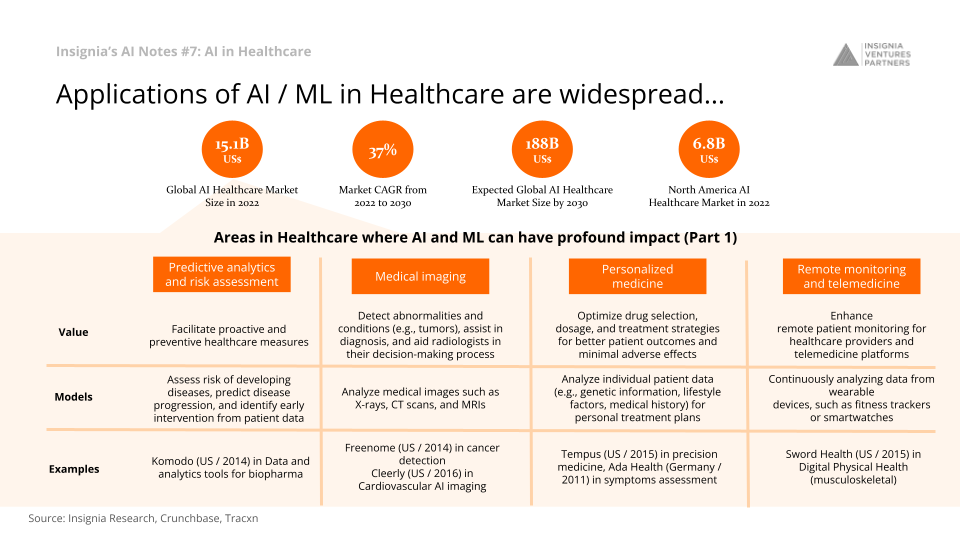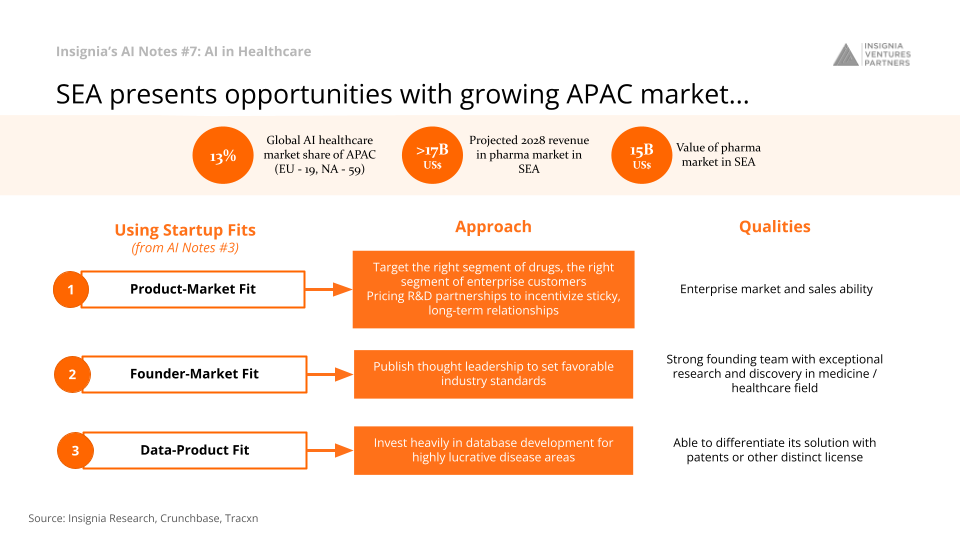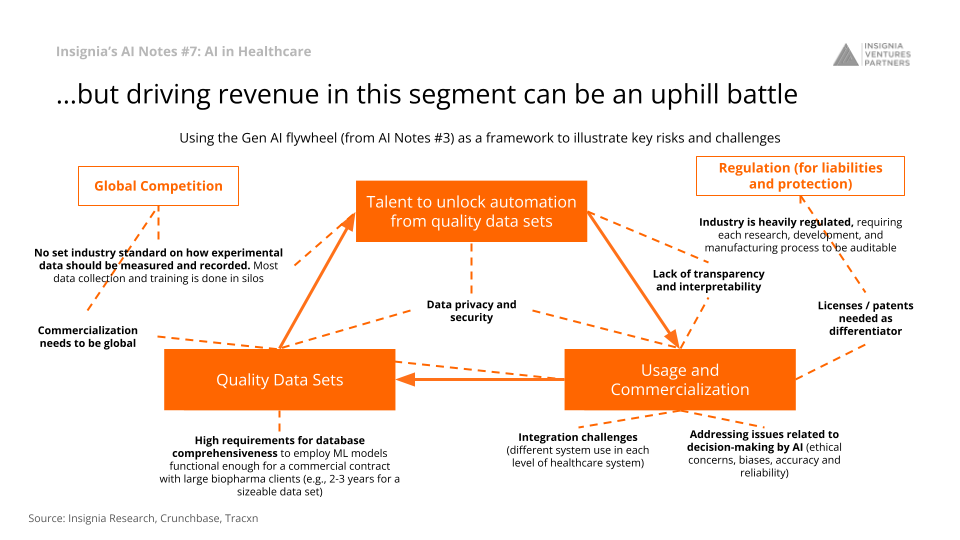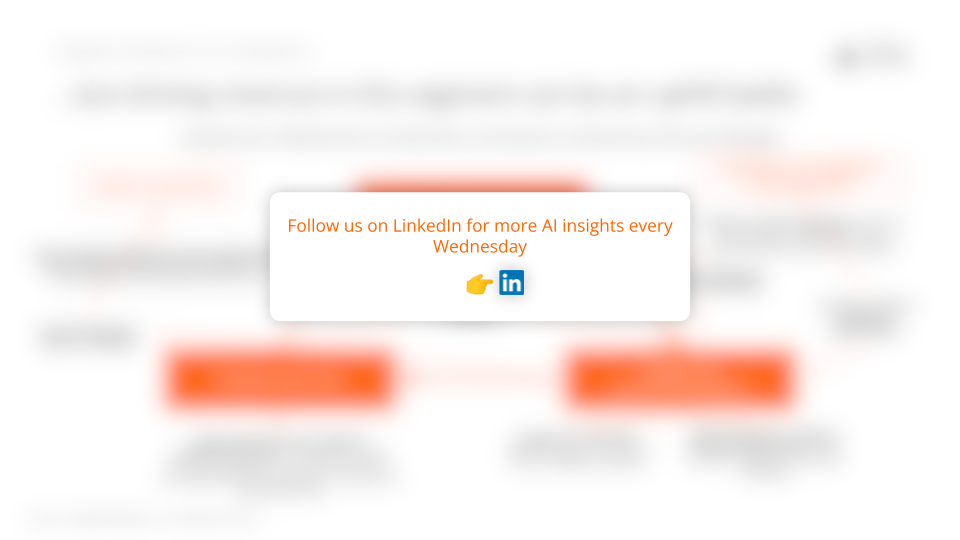Artificial Intelligence (AI) and Machine Learning (ML) are reshaping various sectors across the globe, and healthcare is no exception.
As the demand for efficient, personalized, and cost-effective healthcare grows, the integration of AI and ML in the medical field is becoming an imperative. From predictive analytics to personalized medicine and drug discovery, AI and ML offer exciting prospects to enhance medical practices and the patient experience.
The following article delves into the applications of AI and ML in healthcare, exploring the various ways these technologies are transforming medical processes, driving revenue, and presenting fresh opportunities and challenges in Southeast Asia and beyond.
Check out Last Week’s AI Notes: Generative AI Isn’t Just Speeding Up Productivity, But Also AI Regulation
Part 1: Applications of AI / ML in Healthcare are widespread…

Applications of AI / ML in Healthcare are widespread…
The global artificial intelligence in healthcare market size was estimated at USD 15.1 billion in 2022 and it is expected to surpass around USD 187.95 billion by 2030, growing at a CAGR of 37% during the forecast period 2022 to 2030. North America AI in the healthcare market was valued at USD 6.8 billion in 2022. AI and ML can revolutionize healthcare by improving efficiency, enhancing diagnostics, enabling personalized medicine, and transforming patient care. Here are some areas where AI and ML can have a profound impact:
1. Predictive analytics and risk assessment
Facilitating proactive healthcare measures, predictive analytics enable healthcare professionals to assess the risk of developing diseases, predict disease progression, and identify early interventions.
2. Medical imaging
AI-driven medical imaging helps detect conditions like tumors and assists radiologists in their decision-making process by analyzing various imaging techniques.
3. Personalized medicine
Personalized medicine leverages AI to optimize drug selection, dosage, and treatment strategies, leading to better patient outcomes.
4. Remote monitoring and telemedicine
AI enhances remote patient monitoring and supports telemedicine platforms, providing continuous data analysis from wearables.
5. Virtual assistants and chatbots
Reducing the burden on healthcare providers, AI-driven chatbots help in patient triage and symptom assessment.
6. Electronic Health Records (EHR) management
EHR management with AI enables more effective data analysis and informed decision-making by healthcare providers.
7. Healthcare fraud detection
AI aids in identifying patterns of fraudulent activities in healthcare claims, saving significant costs.
8. Drug discovery and development
AI revolutionizes drug discovery by reducing time and cost.
Part 2: Clinical trials and drug discovery dominate revenue for global AI healthcare market
The clinical trials segment has dominated the AI in healthcare market, holding the highest market share in 2022. With rising investments in research and development, clinical trials contribute significantly to revenue generation. The demand for fast clinical trial results and new drug developments fuels growth in this segment.
Big pharma companies, mainly based in the US, lead the market in drug discovery and clinical trials. Meanwhile, the SEA pharma market stands at only $15B but presents opportunities in oncology, vaccine, and diabetes drugs. AI platforms like Insitro could reduce R&D costs by 20-40%, leading to significant value creation in the industry.
Part 3: SEA presents opportunities with growing APAC market…
With a 13% global AI healthcare market share, APAC presents a growing opportunity, particularly in the SEA region. The SEA pharma market, valued at $15B, is projected to reach over $17B by 2028.
Key strategies for success in the SEA market include:
Product-Market Fit: Targeting the right drug segments and customers, and pricing R&D partnerships strategically.
Founder-Market Fit: Building a strong founding team with exceptional research and discovery abilities and publishing thought leadership to set industry standards.
Data-Product Fit: Investing heavily in database development for lucrative disease areas and differentiating solutions through patents or unique licensing.

Part 4: Driving revenue in this segment can be an uphill battle
Despite the promising growth, several challenges exist:
Data Challenges: Building large datasets and labeling them correctly is a time-consuming process, often taking 2-3 years.
Regulatory Challenges: Strict regulations, data privacy and security, lack of transparency, and integration issues all pose significant hurdles.
Ethical Concerns: The need for collaboration among healthcare professionals, researchers, and technology experts is vital to navigate ethical considerations and harness the full potential of AI and ML in healthcare.
More challenges listed in the graphic below:

Driving revenue in this segment can be an uphill battle
Conclusion
The transformation of healthcare through AI and ML is both profound and multifaceted. From predictive analytics to drug discovery, AI is enhancing diagnostics, enabling personalized medicine, and transforming patient care. While challenges such as regulation, data privacy, and ethical concerns remain, the collaboration between professionals across fields can help harness the potential of this groundbreaking technology. The growing APAC market, particularly SEA, offers ample opportunities for innovation and growth, setting the stage for continued advancement in healthcare across the globe. Whether it’s optimizing existing processes or pioneering new pathways in medicine, AI in healthcare is revolutionizing the way we approach wellness and care.
Follow our LinkedIn page for the latest updates on our weekly AI insights and other insights in Southeast Asia’s innovation landscape.
Author’s Note: This article was written with insights and research from our investment team. Reach out to them if you’re building in this space out of Southeast Asia and would like a deeper conversation.

Follow us on LinkedIn for more AI insights every Wednesday
Paulo Joquiño is a writer and content producer for tech companies, and co-author of the book Navigating ASEANnovation. He is currently Editor of Insignia Business Review, the official publication of Insignia Ventures Partners, and senior content strategist for the venture capital firm, where he started right after graduation. As a university student, he took up multiple work opportunities in content and marketing for startups in Asia. These included interning as an associate at G3 Partners, a Seoul-based marketing agency for tech startups, running tech community engagements at coworking space and business community, ASPACE Philippines, and interning at workspace marketplace FlySpaces. He graduated with a BS Management Engineering at Ateneo de Manila University in 2019.